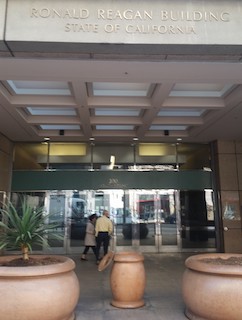Appellate decisions on civil litigation matters can involve issues that also arise in criminal cases. The downtown Los Angeles civil courthouse, known as the Stanley Mosk courthouse, was the venue for Jane H. Doe v. Brightstar Residential, Incorporated.
This case involved issues of double hearsay in a police report. Double hearsay is a frequent issue that arises in preliminary hearings in criminal cases and in DMV admin per se hearings for DUI, so we believe the appellate court rulings on this issue are worth a closer look for their criminal law relevance. For example, in criminal cases, confrontation clause issues can block the admission of a police report (see People v. Sanchez (2016) 63 Cal. 4th 665, 679-698).
The Gist of this Article: The Official Records Exception to the Hearsay Rule allowed admittance of the police report in the following civil case. We regard this Second Appellate Court ruling as a mistake because of the U.S. Supreme Court ruling in Melendez-Dias v. Massachusetts, which the Second Appellate District did not consider.
Ms. Doe, in her twenties, had the mental age of a child due to severe autism and other disabilities. Her disabilities caused her to have many problems with activities of daily living. One of the problems was that she could not recognize hazards like other people. She was therefore housed at Brightstar Residential, a home for people suffering from this and similar disabilities, where she could be closely supervised.
In May 2016, a handyman, Ruben Alcala, sexually assaulted her at this residence for the disabled. Through her father, Ms. Doe sued the residence and its owners for negligence in failing to protect her, negligent hiring, negligent supervision and negligent failure to warn.
The trial court judge, Deidre Hill, granted summary judgment in favor of the defendants because the attack was unforeseeable, so defendants had no duty to protect her.
 Court of Appeal Second Appellate District Los Angeles
Court of Appeal Second Appellate District Los Angeles
On appeal to the Second Appellate District in Los Angeles, Ms. Doe argued that summary judgment must be reversed because the trial court judge excluded evidence from the police report that the residence knew its handyman had a history of harassing women, which was relevant to whether the attack was foreseeable.
The appellate court explained while a police report is generally inadmissible (e.g., Johnson v. Lutz (1930) 253 N.Y. 124, 127-129 [170 N.E. 517, 518-519] [early and influential decision]; see also Alvarez v. Jacmar Pacific Pizza Corp. (2002) 100 Cal. App. 4th 1190, 1204-1206 (“Police accident and arrest reports are usually held inadmissible because they are based on the narrations of persons who have no business duty to report to the police”).
An example of fatal double hearsay would be if Witness tells Person X about Fact Y, and Person X writes a report stating, “Witness said Fact Y.” The report’s account of what Witness told Person X is first-level hearsay. Person X’s written report is second-level hearsay: the written report is an out-of-court statement offered for its truth (See Evidence Code § 1200; Sanchez, supra, 63 Cal. 4th at pp. 674-675; Lake v. Reed (1997) 16 Cal. 4th 448, 459). If a court admitted Person X’s report for its truth, both Witness and Person X could escape cross-examination without any assurance the hearsay was trustworthy. That result is what the hearsay rule aims to prevent.
Double hearsay is admissible if a justification for admitting the evidence rebuts the hearsay objection at each level. Evid. Code § 1201; see Lake, supra, 16 Cal. 4th at pp. 461-462 (admitting party admission in police report); cf. Walker v. Superior Court (2021) 12 Cal. 5th 177, 201 (suggesting probation reports can be admissible as officer records under proper circumstances).
However, there are two types of evidence that can be admissible within a police report. First was an admission against interest. In this case, the owner of Brightstar Residential told police he knew that Alcala had “a history of loitering around the facility and harassing female employees. This was also an admission of a party opponent (see Lake, supra, 16 Cal. 4th at pp. 461-462). Evidence Code § 1220 provides a hearsay exception for admissions by party opponents, and the owner of Brightstar was Doe’s party opponent. The owner’s statement was also admissible for its truth against Brightstar (Evidence Code § 1222).
At level two, the officer’s police report was admissible as an official record (Evid. Code § 1280). The official records exception to the hearsay rule is based on the presumption that public officers properly perform their official duties. When public officers have a duty to make accurate statements about facts within their official knowledge, the great probability is that this incentive will prompt them to work correctly, which creates the trustworthiness that justifies acceptance of the hearsay statement. Jazayeri v. Mao (2009) 174 Cal. App. 4th 301, 317; but see Melendez-Diaz v. Massachusetts (2009) 557 U.S. 305 (an official record prepared for purposes of litigation is not admissible).
We present this short summary as something of a warning, as the Second Appellate District appears to endorse the official records exception to the hearsay rule, perhaps unaware of the U.S. Supreme Court ruling in Melendez-Diaz, supra. We also believe the official record exception should be approached with skepticism and the same rigor as the Sixth Amendment requires, permitting the party opponent the opportunity to cross-examine the reporting officer because, as we are reminded almost daily, police officers often falsify police reports, exclude evidence or simply get things wrong.
The citation for the Second Appellate District Court ruling discussed above is Jane H. Doe v. Brightstar Residential, Incorporated (2nd App. Dist., 2021) 76 Cal. App. 5th 171, 291 Cal. Rptr. 3d 279.
For more information about DMV Hearings, please click on the following articles:
 Court of Appeal Second Appellate District Los Angeles
Court of Appeal Second Appellate District Los Angeles